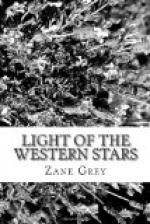“Dear old girl,” he said, more calmly, as he let her go, “you haven’t changed at all, except to grow lovelier. Only you’re a woman now, and you’ve fulfilled the name I gave you. God! how sight of you brings back home! It seems a hundred years since I left. I missed you more than all the rest.”
Madeline seemed to feel with his every word that she was remembering him. She was so amazed at the change in him that she could not believe her eyes. She saw a bronzed, strong-jawed, eagle-eyed man, stalwart, superb of height, and, like the cowboys, belted, booted, spurred. And there was something hard as iron in his face that quivered with his words. It seemed that only in those moments when the hard lines broke and softened could she see resemblance to the face she remembered. It was his manner, the tone of his voice, and the tricks of speech that proved to her he was really Alfred. She had bidden good-by to a disgraced, disinherited, dissolute boy. Well she remembered the handsome pale face with its weakness and shadows and careless smile, with the ever-present cigarette hanging between the lips. The years had passed, and now she saw him a man—the West had made him a man. And Madeline Hammond felt a strong, passionate gladness and gratefulness, and a direct check to her suddenly inspired hatred of the West.
“Majesty, it was good of you to come. I’m all broken up. How did you ever do it? But never mind that now. Tell me about that brother of mine.”
And Madeline told him, and then about their sister Helen. Question after question he fired at her; and she told him of her mother; of Aunt Grace, who had died a year ago; of his old friends, married, scattered, vanished. But she did not tell him of his father, for he did not ask.
Quite suddenly the rapid-fire questioning ceased; he choked, was silent a moment, and then burst into tears. It seemed to her that a long, stored-up bitterness was flooding away. It hurt her to see him—hurt her more to hear him. And in the succeeding few moments she grew closer to him than she had ever been in the past. Had her father and mother done right by him? Her pulse stirred with unwonted quickness. She did not speak, but she kissed him, which, for her, was an indication of unusual feeling. And when he recovered command over his emotions he made no reference to his breakdown, nor did she. But that scene struck deep into Madeline Hammond’s heart. Through it she saw what he had lost and gained.
“Alfred, why did you not answer my last letters?” asked Madeline. “I had not heard from you for two years.”
“So long? How time flies! Well, things went bad with me about the last time I heard from you. I always intended to write some day, but I never did.”
“Things went wrong? Tell me.”
“Majesty, you mustn’t worry yourself with my troubles. I want you to enjoy your stay and not be bothered with my difficulties.”




